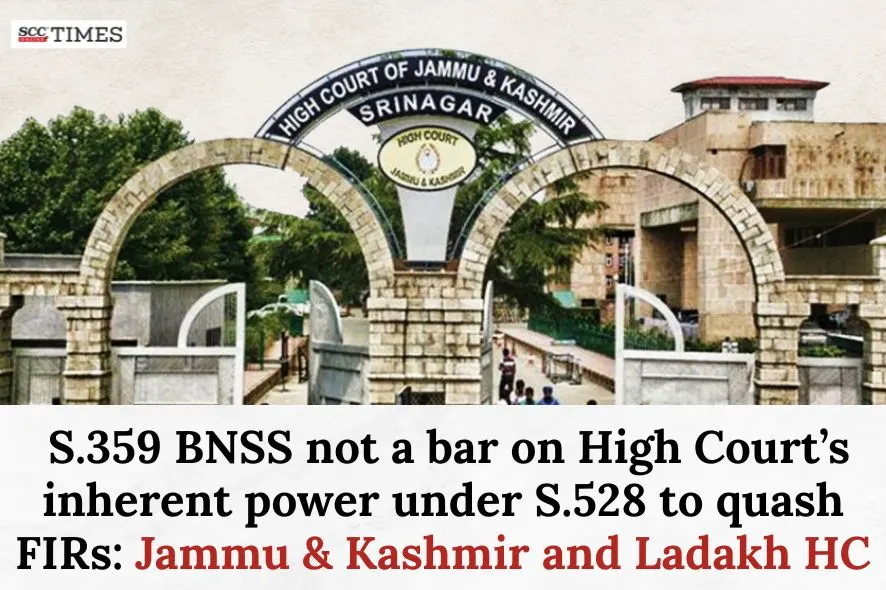Jammu & Kashmir and Ladakh High Court: In the present petition, the petitioner sought quashment of an FIR and the resultant charge-sheet pending before the Special Mobile Magistrate, Electricity, Jammu (‘Special Judge’), on the ground of an amicable settlement of his matrimonial dispute with Respondent 2 (‘complainant’). A Single Judge Bench of Mohd. Yousuf Wani, J., while allowing the petition, quashed the charge-sheet and held that in view of the mutual settlement, continuation of the proceedings would be a futile exercise. The Court clarified that Section 359 of the Bharatiya Nagarik Suraksha Sanhita, 2023 (‘BNSS’) is not a bar on the inherent power conferred on the High Courts under Section 528 BNSS to quash FIRs or other proceedings.
Background:
The petitioner and the complainant were married, but subsequently developed matrimonial dispute which led to the dissolution of their marriage by way of mutual settlement. A petition for dissolution of marriage was also filed by them before the Civil Court, which is presently pending disposal and is likely to be decreed shortly. The complainant had also filed an FIR against the petitioner on 13-03-2024 under Sections 498-A and 109 of the Penal Code, 1860 (‘IPC’), which culminated into the charge-sheet dated 23-05-2024, presently pending disposal before the Special Judge.
The counsel for the private parties submitted that quashing the charge-sheet would meet the ends of justice, as the parties concerned had amicably resolved their matrimonial dispute. However, the State’s counsel submitted that the matter must be dealt with in accordance with law, notwithstanding the compromise between the petitioner and the complainant. He also argued that if complainants and accused in criminal cases were allowed to compound the criminal matters at their discretion, it would lead to lawlessness in society.
Analysis and Decision:
The Court observed that it would meet the ends of justice if the present petition was allowed pursuant to the mutual settlement of the matrimonial dispute between the petitioner and the complainant, as the same would mark the end of the long drawn matrimonial litigation between the two families.
The Court opined that though an FIR cannot be generally and in a routine manner allowed to be quashed in exercise of the powers conferred under Section 528 BNSS, corresponding to Section 482 of the Criminal Procedure Code, 1973 (‘CrPC’), on the ground that the parties have settled their controversy that had become the cause of occurrence, yet exceptional ground appeared to be made out in the present case for invoking its extraordinary powers under Section 528 BNSS to quash the FIR in question.
The Court explained that Section 359 BNSS (Section 320 CrPC) do not restrict but limit and circumvent the Court’s powers under Section 528 BNSS (Section 482 CrPC) regarding quashment of FIRs and criminal proceedings for the sake of the society at large which is the real beneficiary of the criminal justice delivery system.
The Court referred to Gopakumar B. Nair v. CBI, (2014) 5 SCC 800, in which it was held that though quashment of non-compoundable offence under Section 482 CrPC following a settlement between the parties would not amount to circumvention of Section 320, but such power must be exercised with care and caution depending on facts of each case.
The Court relied on Parbatbhai Aahir v. State of Gujarat, (2017) 9 SCC 641, wherein the Supreme Court observed that “the invocation of the jurisdiction of the High Court to quash an FIR or a criminal proceeding on the ground that a settlement has been arrived at between the offender and the victim is not the same as the invocation of jurisdiction for the purpose of compounding an offence. While compounding an offence, the Court’s power is governed by the provisions of Section 320 CrPC. The power to quash under Section 482 is attracted even if the offence is non-compoundable”.
Further, the Court relied on Madan Mohan Abbot v. State of Punjab, (2008) 4 SCC 582, wherein it was observed that “in disputes where the question involved is of a purely personal nature the Court should ordinarily accept the terms of compromise even in criminal proceedings keeping the matter alive with no possibility of a result in favour of the prosecution is a luxury, which the Courts, grossly overburdened as they are, cannot afford and that the time so saved can be utilized in deciding more effective and meaningful litigation”.
The Court observed that permitting the complainant and accused to seek quashment or compounding of criminal proceedings at any stage—investigation, trial, or appeal—based on amicable settlement, does not undermine Section 320 CrPC (Section 359 BNSS). This approach helps avoid further civil or criminal litigation, fosters peaceful relations, and saves the time of the Criminal Courts. Section 482 CrPC (Section 528 BNSS) has an overriding effect and is not subject to Section 320 CrPC (Section 359 BNSS). However, proceedings involving heinous or anti-social offences, or those under special penal laws, cannot be quashed or compounded under Section 482 CrPC (Section 528 BNSS).
The Court opined that criminal litigation between near relatives or co-sharers more often originate from the civil or matrimonial disputes and directing the quashment of proceedings by invoking the inherent powers in matters of personal nature not involving any heinous offence is likely to meet the ends of justice.
Accordingly, the Court, while allowing the petition, quashed the impugned charge-sheet arising out of the case pending trial before the Special Judge.
[Sidharth Mahajan v. State (UT of J&K), 2025 SCC OnLine J&K 1069, decided on 31-10-2025]
Advocates who appeared in this case:
For the Petitioner: Amita Khajuria, Advocate.
For the Respondents: P.D. Singh. Dy. AG, Rahul Aggarwal, Advocate.




